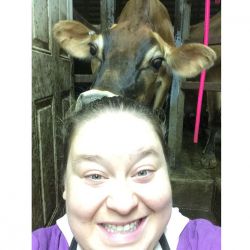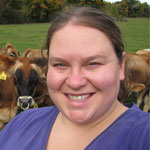
Let’s be real, some numbers we know better than others. I bet we could all tell you how many cows we’re milking and how much milk they’re giving, but without looking it up, could you tell me how many times (insert random cow’s name here) has had mastitis? Or how many days in milk she is? Or how many calves she’s had?
We milk just under 300 Jerseys on our farm, and I milk eleven of the fourteen milkings each week. Considering our milking times are 7 a.m. and 7 p.m., it can be tiring. For example, last night, I was in the barn until 1 a.m. dealing with three new calves and a can full of colostrum to freeze. However, the information and the familiarity with the cows and their lives that I gain from those extra hours are invaluable.
In an age when the public sees a few ear tags and assumes our cows are “just a number,” I think that names can go a long way. Because you see, knowing a cow’s name doesn’t mean just knowing her name, it’s knowing her.
I know all their names, I know how much milk they’re giving, I know what order they come into the parlor, and their reproductive status. I’m not going to pretend I can tell you every single piece of information about all 300 of our cows, but I see every one of them every day.
I like to think of myself as a schoolteacher, except with four-legged, brown critters. Knowing your cows can make all the difference. It can be the difference between knowing a cow has mastitis one milking before she shows it to you. It can be the difference of knowing that a cow lost her pregnancy without ever having rechecked her. I’m not naïve enough to tell you that I catch everything and never forget to check a cow or write down a cow in heat, but when you truly know your cows it makes this job a little more personal and a lot less tedious.

The author dairies in partnership with her parents and brother at Spruce Row Farm in Pennsylvania. Jessica is a graduate of Pennsylvania State University, and since 2015, she has been active in promoting dairy in her local community. You can find her and her 250 Jersey cows on Facebook at Spruce Row Dairy or on Instagram at @seejessfarm.








